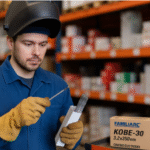Electrical safety is a major part of any kitchen renovation in the UK. This space combines high moisture levels, heat, and heavy power usage—all of which raise the risk of electrical faults. Whether you’re upgrading a small kitchen or installing an entirely new layout, follow these detailed tips to make sure your renovation is safe and fully compliant with UK standards.

1. Use a Qualified Electrician
In the UK, kitchen electrical work falls under Part P of the Building Regulations, which means it must be carried out by a registered electrician. This isn’t just about safety—it’s the law. A qualified electrician will design the layout, choose the correct cabling, and install protection systems that match the kitchen’s load demands. They’ll also notify local authorities if required and issue valid electrical certificates once the work is done. This paperwork is essential when selling the property or making insurance claims.
2. Add Dedicated Circuits for Appliances
Appliances like ovens, washing machines, microwaves, and dishwashers draw a lot of power. Connecting them to the general ring main is unsafe and can overload the system. A safe renovation plan includes dedicated radial circuits for each major appliance. Each one should have its fuse rating, suitable cable thickness, and isolator switch for emergency access. These circuits prevent tripping, reduce fire risk, and ensure each appliance performs properly without straining your electrical system.

3. Ensure Correct Socket Placement
Sockets and switches must be placed carefully in kitchens to avoid splash zones. The regulation minimum is 300mm from the edge of a sink or hob, but adding extra space is even better. If sockets are too close to water, they pose a serious shock hazard. Wall sockets should also be positioned at an accessible height, especially if your kitchen has deep worktops or integrated appliances. Proper planning also avoids trailing wires and makes everyday tasks safer.
4. Choose IP-Rated Lighting Near Water
Lighting near any water source—sink, tap, or extractor fan—must be moisture-resistant. Always check the IP (Ingress Protection) rating of fittings. For kitchens, an IP44 rating or higher is recommended in wet or steamy zones. This ensures the fitting is sealed against splashes and steam that could lead to short circuits or corrosion. IP-rated lights are essential in areas where steam and grease buildup is common, such as over hobs or under extractor hoods.

5. Install Low-Voltage LED Lighting
Modern kitchen lighting should be both safe and efficient. Low-voltage LEDs are the best choice—they produce very little heat, last longer, and reduce strain on your circuits. You can install them as downlights, under-cabinet strips, or pendant lights. Make sure all LED transformers are installed in ventilated areas and the wiring is secured to prevent overheating. LEDs are especially useful for zoned lighting—helping you light preparation areas, dining spots, and general spaces separately.
6. Test and Certify All Work
Every piece of electrical work in your kitchen should be tested before the renovation is considered complete. This includes checking polarity, continuity, insulation resistance, and RCD operation. Your electrician should provide you with an Electrical Installation Certificate. If you’ve altered or added to existing wiring, ask for a full EICR Certificate. These documents prove compliance and protect you in case of a future claim, inspection, or property sale.
7. Plan for Future Needs
Think beyond your current setup. Modern kitchens often need USB sockets, space for smart appliances, and extra outlets for temporary gadgets. It’s cheaper and safer to add those now while the walls are open. Install more outlets than you think you’ll use, and include a few double sockets at strategic points. Good planning today avoids future overloads, trailing extension leads, or costly reworks. If you’re renovating a kitchen in the UK, don’t cut corners on electrical safety. For trusted services like EICR reports, PAT testing, consumer unit upgrades, and full compliance checks, visit Nationwide Surveyors. A safe kitchen protects your investment, your property, and your life.

